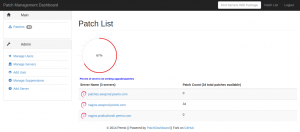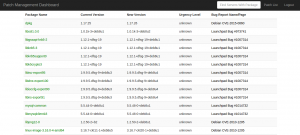PatchDashboard
Having used pakiti by the past, and intending to setup some version tracking system to keep an eye on a setup I started managing recently, I was looking for an alternative that would work out of the box – which is my main grudge against pakiti2, I have a large set of patches, scripts, database init dump, which makes it pretty impractical to setup from scratch.
Investigating on the subject, I stumbled upon several rpm-based solutions, such as PulpProject, SpaceWalk or its successor: Katello.
Although the setup I’m working with today is build around Ubuntu, and a couple Debian. Which is how I ended up trying out PatchDashboard.
There’s a couple stuff I noticed during install on Debian jessie. A detail regarding http proxies if you have such. And ultimately, a certificate error on their website.
I also sent a few pull requests dealing with php errors, mostly cosmetic [1, 2, 3, 4, 5, 6], some more practical [7, 8, 9, 10], and adding Debian jessie to their database init script [11, 12].
Having dealt with that, everything works pretty much as expected.
Next stuff I added to my setup, is some patch listing installed nodejs packages, and known vulnerabilities (according to snyk).
I’m not sure these would be relevant enough to send a pull request, this is a whole new feature, that only makes sense for those hosting nodejs-based apps.
Note I did publish the corresponding changes, yet only to my fork on github,

